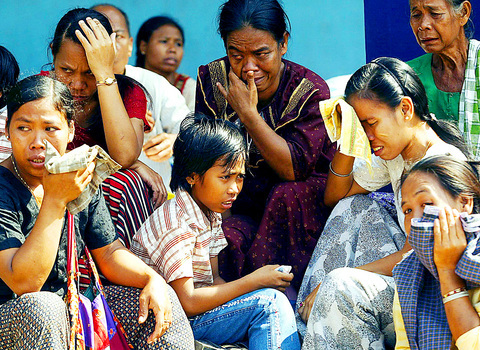India's tangled bureaucracy bungled the first alerts on the tsunami strike losing precious time which could have saved lives, newspapers reported yesterday.
India's air force was warned that a remote base on Car Nicobar island had been flooded well before the giant waves hit the mainland coast hundreds of kilometers away on Sunday morning, the Indian Express said.

PHOTO: AP
"At 7:30 am (0200 GMT) we were informed .... about a massive earthquake near Andamans and Nicobar," air force chief S. Krishnaswamy told the daily. "But communications links went down" with the islands.
"The last message from Car Nicobar base was that the island is sinking and there is water all over."
At 8:15am, the air chief says he asked an assistant to alert the defense ministry.
On the civilian side, totally disconnected from the military, the Indian Meteorological Department had sent a warning fax out at 8:54 am -- but it went to the former science minister Murli Manohar Joshi, and not the incumbent Kapil Sibal. The government changed last May.
Unaware of the mistake, the department then sent another fax to the Home Ministry's disaster control room, at 9:41 am.
At 10:30 (0500 GMT), the control room informed the cabinet secretariat.
Thousands were already dead along India's devastated southeastern coastline.
The Crisis Management Group, India's main emergency response body, finally met at one pm.
The country's top science and technology official told The Times of India that his department learnt of the tsunami strike from the television. V.S. Ramamurthy, secretary at the department, said they had "no clue."
The undersea earthquake hit off Indonesia's Sumatra at 6:29am, sending killer tsunamis racing across the Indian Ocean. Although Indian scientists monitored the quake, because it was outside the country, they just relaxed, the Times said. That had been "the first mistake," Ramamurthy said.
India will now install systems to detect tsunamis at the cost of more than US$27 million, Sibal said Wednesday.
An international expert told the Express that India had turned a deaf ear to repeated warnings it needed a tidal wave alert system similar to that used by many countries because of the costs.
Nearly 11,000 people died in India and thousands are still unaccounted for, particularly on the Andaman and Nicobar islands where communications facilities are poor or non-existent.

LANDMARK CASE: ‘Every night we were dragged to US soldiers and sexually abused. Every week we were forced to undergo venereal disease tests,’ a victim said More than 100 South Korean women who were forced to work as prostitutes for US soldiers stationed in the country have filed a landmark lawsuit accusing Washington of abuse, their lawyers said yesterday. Historians and activists say tens of thousands of South Korean women worked for state-sanctioned brothels from the 1950s to 1980s, serving US troops stationed in country to protect the South from North Korea. In 2022, South Korea’s top court ruled that the government had illegally “established, managed and operated” such brothels for the US military, ordering it to pay about 120 plaintiffs compensation. Last week, 117 victims

China on Monday announced its first ever sanctions against an individual Japanese lawmaker, targeting China-born Hei Seki for “spreading fallacies” on issues such as Taiwan, Hong Kong and disputed islands, prompting a protest from Tokyo. Beijing has an ongoing spat with Tokyo over islands in the East China Sea claimed by both countries, and considers foreign criticism on sensitive political topics to be acts of interference. Seki, a naturalised Japanese citizen, “spread false information, colluded with Japanese anti-China forces, and wantonly attacked and smeared China”, foreign ministry spokesman Lin Jian told reporters on Monday. “For his own selfish interests, (Seki)

Argentine President Javier Milei on Sunday vowed to “accelerate” his libertarian reforms after a crushing defeat in Buenos Aires provincial elections. The 54-year-old economist has slashed public spending, dismissed tens of thousands of public employees and led a major deregulation drive since taking office in December 2023. He acknowledged his party’s “clear defeat” by the center-left Peronist movement in the elections to the legislature of Buenos Aires province, the country’s economic powerhouse. A deflated-sounding Milei admitted to unspecified “mistakes” which he vowed to “correct,” but said he would not be swayed “one millimeter” from his reform agenda. “We will deepen and accelerate it,” he

Japan yesterday heralded the coming-of-age of Japanese Prince Hisahito with an elaborate ceremony at the Imperial Palace, where a succession crisis is brewing. The nephew of Japanese Emperor Naruhito, Hisahito received a black silk-and-lacquer crown at the ceremony, which marks the beginning of his royal adult life. “Thank you very much for bestowing the crown today at the coming-of-age ceremony,” Hisahito said. “I will fulfill my duties, being aware of my responsibilities as an adult member of the imperial family.” Although the emperor has a daughter — Princess Aiko — the 23-year-old has been sidelined by the royal family’s male-only